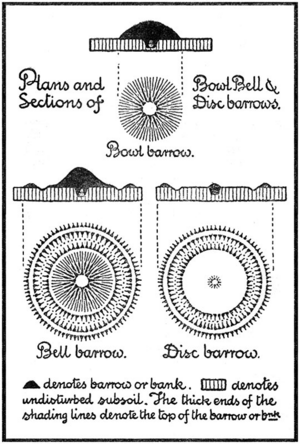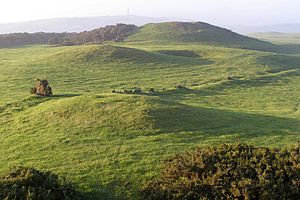Round barrow facts for kids
A round barrow is like a big, ancient mound of earth or stones. People built these mounds long, long ago to cover burials. Think of them as special monuments from the past. They are one of the most common types of ancient sites found by archaeologists. You can find them in many parts of the world, especially in Europe, because they were simple to build and served a common purpose.
In Britain, most round barrows were built between 2200 BC and 1100 BC. This time period covers the Late Neolithic (New Stone Age) and the Late Bronze Age. Later, during the Iron Age, people built different kinds of burial mounds, sometimes square ones.
Contents
What is a Round Barrow?
At its simplest, a round barrow is a dome-shaped hill. It's made of earth, stones, or both. This mound was built over a burial placed right in the middle.
How Were They Built?
Builders used many methods to create these mounds. Some barrows were simple piles of material. Others were more complex. They might have layers of stone, soil, and even grass (turf). Sometimes, wood or woven branches (wattle) helped hold the structure together.
Around the mound, there might be a ditch. Some barrows also had stone edges called kerbs. A flat area called a berm could be found between the ditch and the mound.
The main burial was often in a stone box called a cist. It could also be in a grave dug into the ground. Archaeologists find both full bodies (inhumations) and ashes (cremations) placed in pots inside these barrows.
Many round barrows have other burials around them. These are called satellite burials. Sometimes, people from completely different cultures added new burials into the mound much later. This could be hundreds or even thousands of years after the barrow was first built.
Different Kinds of Barrows
There are many types of round barrows. Some common ones include the bell barrow, which looks like an upside-down bell. The bowl barrow is shaped like a simple bowl. Others are flatter, like the saucer barrow and disc barrow. Each type has its own unique shape and features.
Famous Round Barrows Around the World
Round barrows are important historical sites. They teach us a lot about ancient people and their customs. Let's explore some examples from different regions.
Ancient Barrows in Denmark
Denmark is home to many ancient mounds, including round barrows. People built these barrows over a very long time. They range from the Neolithic Stone Age to the Viking Age. This shows how important these burial traditions were.
Danish barrows have many different designs inside. However, they often look similar from the outside. The government protected these ancient mounds by law in 1937. This helps keep them safe for future generations.
-
Loddenhøj near Aarhus. Many smaller round barrows in Denmark are surrounded by farm fields.
British Barrows: A Look Back in Time
In Britain, most round barrows date back to the Early Bronze Age. Some older examples from the Neolithic period are also known. Later, people like the Romans, Vikings, and Saxons sometimes reused these ancient mounds.
Famous examples include Rillaton barrow and Round Loaf. When many round barrows are found close together, archaeologists call the area a barrow cemetery. These sites are like ancient graveyards.
English Barrow Sites
England has many impressive round barrow sites. For instance, along the south Dorset Ridgeway, you can see numerous barrows. These include various subtypes, showing the rich history of ancient burials.
Irish Barrow Sites
Ireland also has important round barrows. The Blessington demesne barrow in County Wicklow is one example. Another is the Gaulstown Barrow in County Meath. These sites help us understand Ireland's ancient past.
See also
- Kurgan
- Stupa
- Tumulus
 | Calvin Brent |
 | Walter T. Bailey |
 | Martha Cassell Thompson |
 | Alberta Jeannette Cassell |







